There are (at least) two big challenges official statistics will be faced with in the next few years and which will possibly change its quasi-monoplistic position.
.
On the input side it’s Big Data
‘“Big Data” is a term used to describe massive information stores – generally measured in petabytes and exabytes – and also refers to the methods and technologies used to analyze these large data volumes. The core principles of Big Data (data mining, analytics) have been around for some time, but recent technology has enabled the collection and analysis of previously unimaginable data volumes at extremely high speeds.’ So says for example SAP and gives some examples how Big Data will change your life (big words and they show how big software and hardware players begin to occupy the field).
Official Statistics has already put this on the agenda! And so has the in United Nations Statistics Division’s (UNSD) Friday Seminar on Emerging Issues, 22 February 2013.
Some papers from this Seminar:
Gosse van der Veen Statistics Netherlands. High Level Group for the Modernization of Statistical Products and Services. Big Data: Big Opportunity!
The High-Level Group for the Modernisation of Statistical Production and Services (HLG) established an informal Task Team of national and international experts, coordinated by the UNECE Secretariat. The Paper of this group gives an excellent overview of the topic: What Does “Big Data” mean for Official Statistics.
.
Andrew Wyckoff, Big Data for Policy,Development and Official Statistics, Directorate for Science, Technology & Industry. Organisation for Economic Co-operation and Development OECD (personal opinion).
.
Aspects of Big Data and real-time analytics are provided in another paper by Global Pulse (an innovation initiative launched by the Executive Office of the United Nations Secretary-General): Big Data for Development: Opportunities & Challenges
.
The discussion is launched and as mentions the HLG paper: ‘To use Big data, statisticians are needed with a different mind-set and new skills. The processing of more and more data for official statistics requires statistically aware people with an analytical mind-set, an affinity for IT (e.g. programming skills) and a determination to extract valuable ‘knowledge’ from data. These so-called “data scientists” can be derived from various scientific disciplines.’
.
On the output side it’s (Linked) Open Data in combination with APIs
Open Data is not at all a new topic for Official Statistics. National Statistical Institutes were forerunners in openly providing data; organizations like UN or EUROSTAT went this way as well.
Several Open Data initiatives (USA, UK, France, EU …) consist mostly of data catalogues, and are in that sense also public relations initiatives. A large part of the data so provided consists of statistical data already available, often, on the website of the National Statistical Institute concerned. The EU portal, for instance, offers 5716 datasets of statistical data from a total of 5893 (as of April 2013).
Further central questions are the licensing of data,  as well as their availability in machine-readable formats.
as well as their availability in machine-readable formats.
Machine-readable statistical data, Application Programming Interfaces (APIs) to the data and especially Linked Open Data LOD (–> essentials, –>tutorial) open the way to creative applications and new models of presenting information.
An Europe-wide Linked Open Data (LOD2) project ‘was launched in September 2010 and will run for four years. It addresses exploitation of the web as a platform for data and information integration, and the use of semantic technologies to make government data more useable.’
Looking for third-party APPs
Data Providers are looking at applications or mashups made with their data with much interest, and they are even sponsoring competitions and hack days (like Apps4EU) to stimulate the reuse of open data, especially from the public sector.
The most popular APP creator and statistical storyteller is Hans Roslings with Gapminder. Rosling himself is a pioneer in fighting for open data.
http://www.youtube.com/watch?feature=player_embedded&v=jbkSRLYSojo
Changing paradigms
Open Data, Linked Open Data and APIs are changing the dissemination paradigm of statistical agencies. More people with new skills will do new things. Coding is becoming the new literacy, says i.e. Garrett Heath in his advice for his unborn daughter: ‘I was blown away that the buzz is not around mobile apps, but rather around using APIs. Ten years ago saw the creation of the social networking platforms. The past five years has been about accumulating the data. The next five years and beyond will be about interpreting that data. [My daughter will have access to] a boatload of interesting data sitting in accessible databases that is waiting to be exposed and interpreted with her [the programmer’s]) creativity.’
Storytelling with data
Storytelling based on data is less and less the domain of statistical agencies. Storytelling can access multiple (new) resources and take on new forms. To satisfy the basic idea of an easily understandable and appealing presentation of statistical content, statistical institutions cannot avoid taking certain measures to improve their content and presentation. The “composer” must know how the music is to be played, that is as a quick, competent, qualitatively unique, reliable and indispensable data source.
But this presentation job can no longer be done on one’s own: cooperative partnerships are necessary and have already begun to some extent, both with partners outside statistical institutions and between such institutions. This discussion has been launched.
Statistical Storytelling revisited! More in a paper from IMAODBC Vilnius 2010:
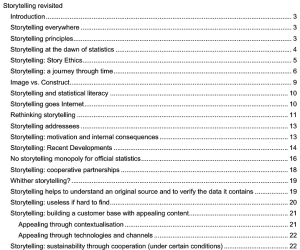 .
.
And this: Many small open data give big data insights
FORGET BIG DATA, SMALL DATA IS THE REAL REVOLUTION says Rufus Pollock co-Director of the Open Knowledge Foundation : ‘… the discussions around big data miss a much bigger and more important picture: the real opportunity is not big data, but small data. Not centralized “big iron”, but decentralized data wrangling. Not “one ring to rule them all” but “small pieces loosely joined”.’

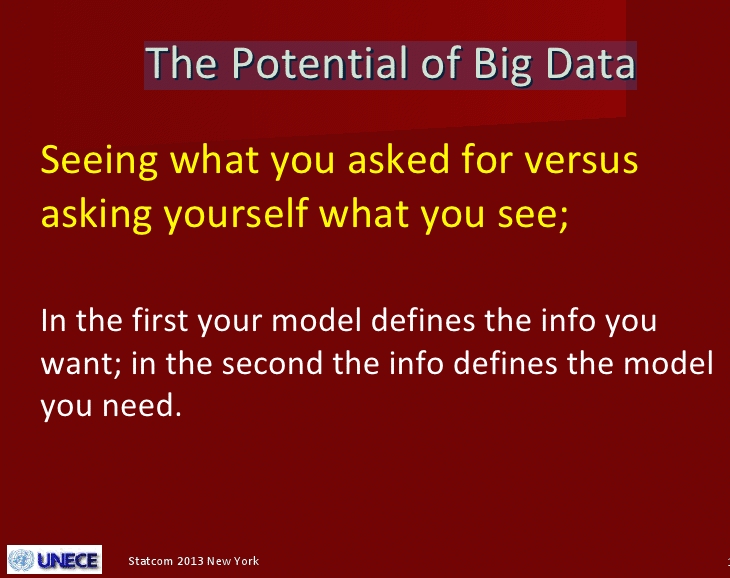
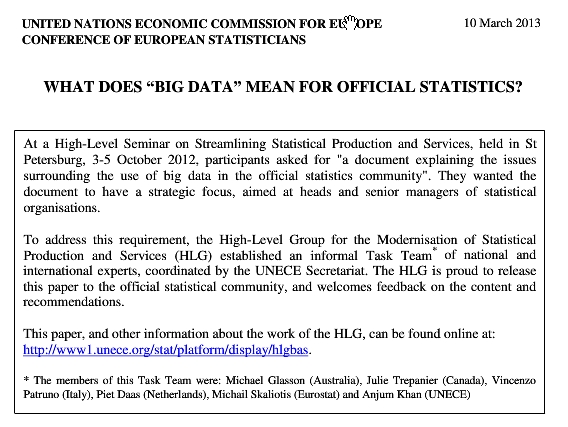
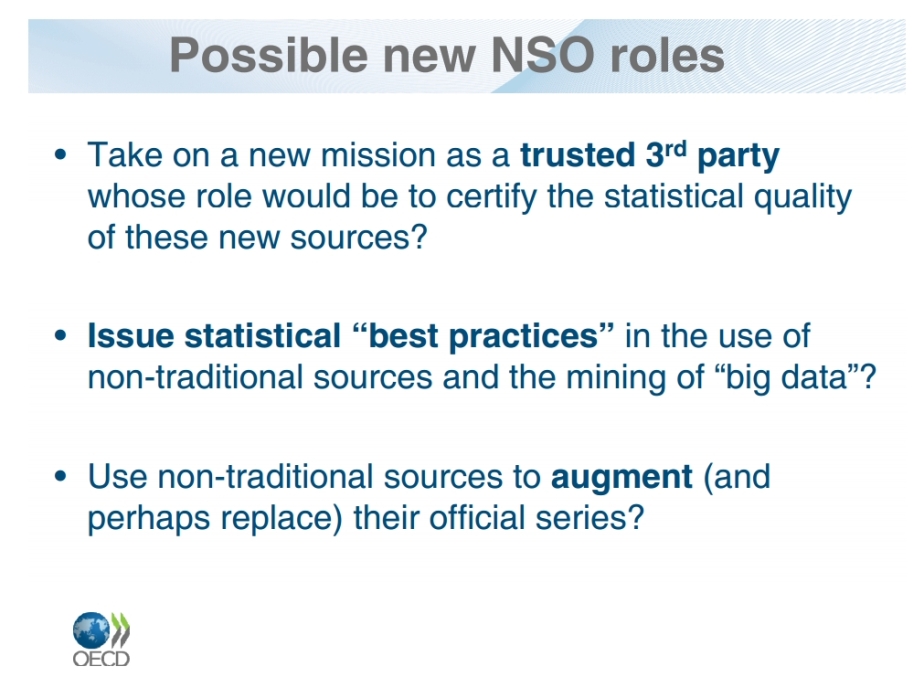
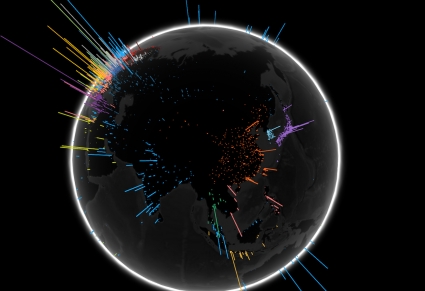
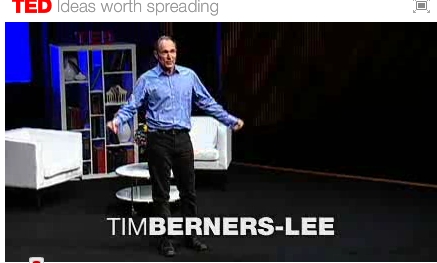

Wonderful work! This is the kind of info that should be shared around the internet.
Disgrace on the search engines for now not positioning this
post higher! Come on over and talk over with my site . Thank you =)
Google operates countless services for webmasters and that includes some of the most useful
ones for bloggers. If you have multiple tracks it may be easier to just select one and
click on Solo. The Snowball delivers good quality at an affordable price.
whoah this blog is magnificent i really like studying your posts.
Keep up the great work! You know, a lot of individuals are searching round
for this info, you can aid them greatly.
Hi it’s me, I am also visiting this site regularly, this web site
is in fact nice and the people are in fact sharing good thoughts.
Hi mates, how is all, and what you would like to say on the topic of this article, in my view its really
awesome in favor of me.
Very great post. I just stumbled upon your blog and wished to say
that I’ve really loved surfing around your blog posts.
In any case I’ll be subscribing in your feed and I am hoping you write again very
soon!